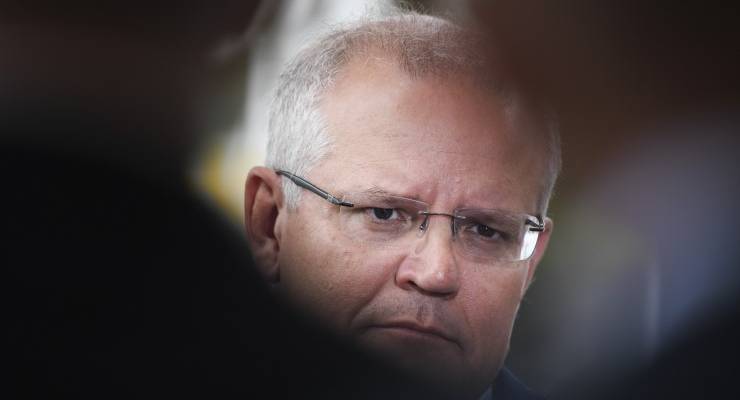
How many ways can we say the same thing? The Great Morrison Stagnation is not merely continuing, but worsening.
Yesterday the ABS revealed that wages growth, after being stalled at 2.3% annual growth for the last year, fell back to 2.2% in the three months to September, off just 0.5% growth for the quarter.
For months the government has been clinging to the lie that wages growth is “picking up”, reflecting its ever-optimistic, ever-wrong budget forecasts.
“Wages growth is actually picking up,” Finance Minister Mathias Cormann, one of the few competent ministers in this do-nothing debacle of an outfit insisted a year ago. He repeated the claim in March: “Our economic agenda has been successful in delivering stronger growth, in delivering stronger employment growth, in helping to drive the unemployment rate down and wages growth is picking up.”
Cormann even repeated the claim last week. “Something we don’t read much about, in fact we are often told the opposite somehow — wages growth is picking up.”
By that stage, even the RBA had given up saying that — as indicated in a bald sentence in the November Statement of Monetary Policy: “… wage growth is no longer expected to pick up.” It downgraded its forecasts to 2.2% for the rest of this calendar year, before growth “picks up” again next year… to 2.3%, where it will stay well into the 2020s.
The ABS told a similar story to that of the June quarter, and the March quarter, and the December 2018 quarter, all the way back to 2017 when WPI finally fell over the 2% threshold.
The only decent growth was in Victoria and in health and social care. Want a decent pay rise? Get into health, move to Melbourne and join a union. Otherwise, you can look forward to years of wage rises being barely above inflation.
That’s now the fate of Scott Morrison’s “quiet Australians” — the millions working in manufacturing (growth of just 1.8% in the year), or construction (1.9%), or retail (1.9%), whose wages have barely even kept ahead of inflation.
Cormann isn’t the only one in denial. It was fascinating to watch Seven and Nine yesterday blame not the government’s failure to address weak demand for their declining ad revenues but the tech giants and the Hayne royal commission.
“Credit is a big one. When there’s a tightening of credit, it affects all markets,” Liberal supporter Kerry Stokes explained (before going on to deny a link between bushfires and climate change). Google and Facebook were “like a vacuum cleaner; they come to Australia, vacuum up all the money and go away again”.
Meanwhile, Liberal elder Peter Costello and Liberal fundraiser Hugh Marks at Nine blamed the “post-Hayne commission environment” for “choking credit” for their advertising woes. Nothing to do with household income between savaged by low wages growth and Scott Morrison’s accelerating tax take, which has caused a collapse in retail sales growth and car sales and slashed economic growth.
And what did Frydenberg have to say about the dismal numbers? He stayed silent in his undisclosed location. As for Cormann, asked in the Senate about the numbers, he attacked Labor and claimed wages were growing faster than inflation. Well, not in your own state, Minister: WPI grew by just 1.6% in the west, the same level as Perth CPI, and the lowest in the country for the fifth quarter in a row (in the midst of the second biggest iron ore price boom in history too!).
And if Cormann wants to play that game, in 2011-12, when wages growth was last healthy, real wages grew a whopping 2.6% off the back of strong wages growth under Labor’s mining investment boom and low inflation. Even at the end of 2012, real wages were still growing at 1.2% in annual terms. The best real wages has managed since the Coalition was elected was 1.1%, briefly, in 2016, not because of strong growth but because inflation reached a nadir of 1%.
This year? Real wages growth was momentarily at 1% in annual terms in the March quarter. Then it sunk to 0.7%. In September it was 0.5%. The average over the three years to September 2019? Just 0.3%.
That’s “quiet Australians” being screwed by business and a government that seems to revel in a deliberate policy of wage stagnation. And it’s going to continue.









The Belgian reminds me of the Monty Python pet shop owner bigging up the dead parrot.
The conservative liars can lie even larger lies than ever, but facts are clear, that we have some of the dumbest, deliberately stupid, fanatical, regressive, unqualified, undereducated people in office today, those who have learned nothing beyond some childish self gratification. Perhaps the P M and the treasurer polish the tip to mirror like quality, so as to glory in narcissistic self reflection.
Oh well quiet Australians, you’ve got to wait another 2 and half years to quietly sneak into the booth and express your frustration ( apparently) with really low wage growth, lemming like grasping for impossibly expensive housing and not much happening about the climate changing around you. Ah but at least you’ve been shuffled in orderly fashion to the gallows, with nary a peep like that loud Swedish girl.
If we go from stagnation to recession, don’t think that’s curtains for the government. Morrison is a shameless ad man – he’ll gaslight his “Quiet Australians” all the way down. You’ll even see him at homeless shelters, handing out care packages with that shit-eating grin on his face.
And people will fall for it. Look it up in your gut – you know it’s true.
Cormann said three times that wages growth was picking up, the same number of times that Peter denied Christ.
For some unaccountable reason the Gospels neglected to mention that Peter was, up to that point, one of the more competent Apostles.